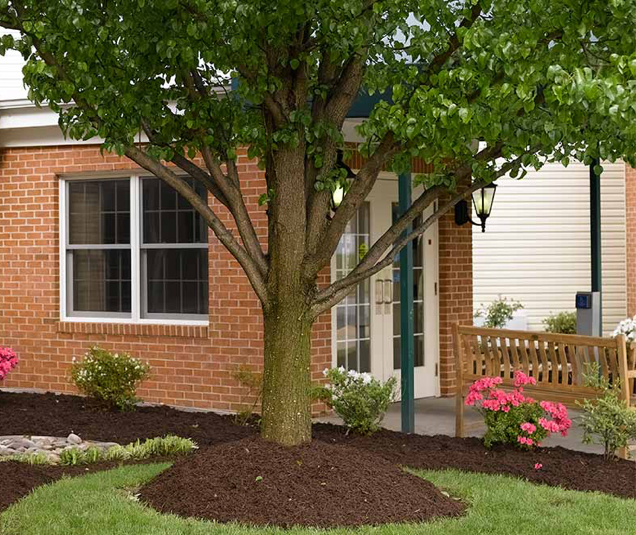When a loved one is facing memory-related challenges, such as Alzheimer’s disease or another form of dementia, families are often met with the overwhelming responsibility of ensuring they receive the care, support, and dignity they deserve.
Selecting the right level of care—or a community offering adaptable levels as needs evolve—can help families plan confidently for the future.
Choosing an assisted living community that offers dedicated memory care provides practical and emotional support, creating a nurturing environment designed to meet the complex needs of those with memory loss while supporting family caregivers.
What Is Memory Care in Assisted Living?
Memory care is a specialized type of long-term care designed for individuals living with dementia or cognitive decline.
Memory care integrates the personal assistance of traditional assisted living, such as help with daily activities, meals, and medication management, with customized memory support programs. These programs are led by trained staff, emphasizing cognitive stimulation, safety, and a structured yet adaptable routine.
Unlike traditional assisted living, memory care communities feature enhanced security measures and trained team members to provide 24/7 supervision, minimize confusion, and foster familiarity and comfort.
Benefits of Choosing an Assisted Living Community with Memory Care
Assisted living and memory care are two separate types of senior living communities, each designed for different needs and lifestyles. A community that offers both provides the advantage of allowing seniors to access the appropriate level of care as their needs change.
Personalized, Compassionate Care
In memory care, caregivers recognize that each resident’s experience with dementia is unique. Staff work closely with families to gain a thorough understanding of their loved one’s medical history, personal preferences, and daily routines.
The collaborative process results in a highly individualized care plan that honors their past while addressing their present needs with compassion and understanding.
This kind of care includes:
- Assistance with activities of daily living (ADLs), like bathing, dressing, and grooming
- Medication management
- Regular health assessments & communication with healthcare providers
- Encouragement of independence while offering gentle guidance & support
Safety & Security
Safety is a top concern for families of those with memory loss. Wandering is a common behavior among individuals with dementia, which can put them at risk. Memory care communities are designed with this in mind, incorporating safety features like:
- Secured entrances & exits
- Monitored common areas
- Emergency response systems in private rooms
- Staff trained in redirection & de-escalation techniques
These measures help keep residents safe without restricting their freedom more than necessary.
Purposeful Engagement & Programming
Engaging in familiar and meaningful activities can help individuals with memory loss feel more connected and fulfilled. Memory care communities typically offer structured programming that includes:
- Music and art therapy
- Reminiscence activities
- Fitness & movement classes
- Gardening, puzzles, & sensory games
- Social gatherings & seasonal events
These activities are designed to stimulate cognitive function, boost mood, and provide opportunities for connection with others.
Reduced Caregiver Stress
Caring for a loved one with dementia at home can be emotionally and physically exhausting. Families often struggle to balance caregiving responsibilities with work, personal time, and other obligations.
Transitioning to a memory care community can relieve some of this burden, giving you confidence that your loved one is well cared for.
This transition also helps families focus on enjoying quality time together—free from the stress of managing every aspect of care.
Trained & Compassionate Staff
Memory care team members undergo specialized training to understand the nuances of dementia care. They’re equipped to manage behavioral changes, support communication challenges, and provide care with empathy and patience.
Their ongoing education equips them to use current, effective methods in memory support and change care techniques as residents’ needs evolve.
Residents benefit from consistent, familiar caregivers who build trust and rapport, which is critical for individuals with memory loss.
Nutritious Meals & Wellness Support
Eating well is essential for seniors, especially those with cognitive impairments. Memory care communities provide:
- Nutritious, easy to eat meals
- Staff assistance to remind residents when to eat
- Hydration support
- Modified diets for medical conditions or preferences
Meals are served in calm, supportive settings, often with visual or verbal prompts to encourage participation and reduce frustration.
Many communities also offer fitness programs and wellness services, such as physical therapy or chronic disease management, to support overall health.
A Structured Yet Flexible Environment
Routine plays a crucial role in memory care. Familiarity helps reduce anxiety and improve confidence. At the same time, flexibility respects residents’ individual needs. A well-balanced daily schedule includes:
- Predictable mealtimes & activities
- Consistent caregivers
- Ample rest periods
- Personalized room setups with familiar items
The structured rhythm fosters stability while encouraging independence within a safe, supportive framework.
Family Involvement & Support
Memory care communities actively involve families in the care process through:
- Regular care planning meetings
- Family education programs
- Opportunities to participate in events or activities
- Emotional support groups or counselling services
Staying connected with your loved one’s care team creates a partnership rooted in trust and shared goals.

Peace of Mind
One of the most significant benefits of choosing an assisted living community with memory care is the peace of mind it brings. Knowing your loved one is safe, engaged, and surrounded by compassionate professionals can ease the emotional weight many families carry.
You can focus on creating meaningful memories rather than managing day-to-day tasks alone.
When to Consider Memory Care
Recognizing when it’s time to consider memory care can be challenging. Signs that a loved one might benefit from a memory care community include:
- Frequent confusion or disorientation, even in familiar places
- Unsafe wandering or getting lost
- Changes in mood, personality, or behavior
- Difficulty with hygiene, meals, or medication
- Caregiver burnout or feelings of being overwhelmed
When your loved one’s needs surpass what can reasonably be managed at home, it may be time to explore professional support.
A Community That Supports Every Step
At Peregrine Senior Living at Salisbury, we understand how important it is to find support that satisfies your loved one’s needs. Our memory care program in Salisbury, MD, is rooted in dignity, purpose, and personalized attention.
We offer safe surroundings, thoughtful programming, and compassionate care that empowers residents to live meaningfully, no matter where they are in their journey.
Schedule a visit today to see how our community can provide the support and peace of mind your family deserves.













No more posts